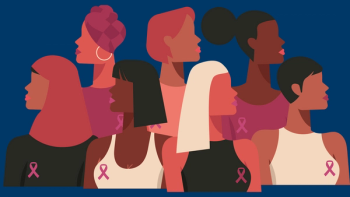
Duquesne University School of Nursing | Strategic Alliance Partners
Latest from Duquesne University School of Nursing


It is imperative that nurses and other health care professionals not only recognize the disparities in preventive screenings but become part of the solution. Early detection and cancer treatment must be accessible for those with disabilities, as it can help save lives.


As life expectancies grow longer in Lebanon, there is an increase in the amount of people diagnosed with cancer.

A team of researchers at the University of Pittsburgh School of Nursing set out to better understand the interpersonal communication components of breast cancer navigation services.

Research has shown that pain and anxiety are related to port access, so a need exists to capture patients’ feelings and emotions related to living with a port, as well as effective nursing interventions aimed at addressing those patient experiences.

By taking the nonthreatening approach of consulting a genetic counselor, plus the simple act of sending out a freshly collected 1-cc sample of saliva, I will affect not only my health but also the well-being of my daughters, son, and grandchildren.

Obesity has overtaken smoking as the leading preventable cause of cancer. Among patients diagnosed with cancer, obesity has been linked to poor prognosis.

Rapid response teams (RRT) are used extensively in many hospitals, including major cancer centers; however, research shows that adverse outcomes are more common for patients who require RRT intervention than among the general hospital population.

While oncology nurses have undoubtedly led quality cancer care and patient education initiatives, the current and projected growth of cancer survivors in the United States demands increased attention to developing oncology nurses in the educator role.

Joan Such Lockhart, PhD, RN, CORLN, AOCN, CNE, ANEF, FAAN, clinical professor, Duquesne University School of Nursing, discusses the ‘supply and demand' of oncology nurses.

Joan Such Lockhart, PhD, RN, CORLN, AOCN, CNE, ANEF, FAAN, clinical professor, Duquesne University School of Nursing, discusses a study looking at educating non-oncology nurses on cancer survivor care.

Research on the role of spirituality in healthcare continues to grow, and for patients with cancer, religious and spiritual values can be especially important to their overall quality of life throughout their cancer journey.

Electronic health records (EHR), which have been found to improve care and management of multiple chronic diseases in older adults, could also be customized to improve cancer screening rates in this population by integrating recommended screening protocols based on age, family history and other environmental, occupational, and behavioral risk factors (ie, smoking and alcohol use).

Conversations happen across clinical settings every day. In conjunction with her family, a mother makes decisions about radiation, chemotherapy, and surgical treatments for breast cancer.

Persistent infection with specific subtypes of human papillomavirus (HPV) has been definitively linked to progression to cervical cancer.

It is widely accepted that the single greatest risk factor for cancer is age. Sixty percent of cancers and two-thirds of cancer deaths occur over the age of 65 years.

The American Cancer Society estimates that in 2013, 142,820 individuals in the United States will be diagnosed with colorectal cancer and 72,570 with bladder cancer

Rebecca Kronk, PhD, CRNP, MSN, Assistant Professor, School of Nursing, Duquesne University, discusses medication for sleep issues in pediatric cancer patients.

Rebecca Kronk, PhD, CRNP, MSN, writes about evidence recognizing sleep disturbances and fatigue as common occurrences in children with cancer during treatment, after treatment, and in long-term survivors.

Rebecca Kronk, PhD, CRNP, MSN, Assistant Professor, School of Nursing, Duquesne University, discusses a nurse's role in coping with sleep issues in pediatric cancer patients.

Linda Goodfellow, PhD, RN, of Duquesne University, discussing the important role nurses play in supporting the spouses of patients with cancer, a critical, yet often unmet need.

Joan Such Lockhart, PhD, RN, AOCN®, FAAN, Duquesne University School of Nursing, discusses the growing number of cancer survivors and the need for continued care outside of an oncology setting.